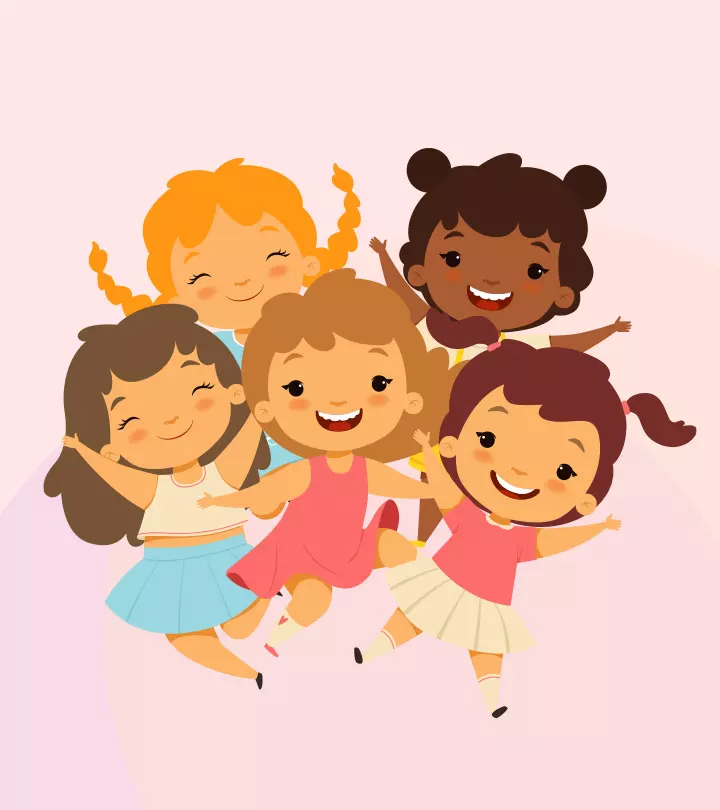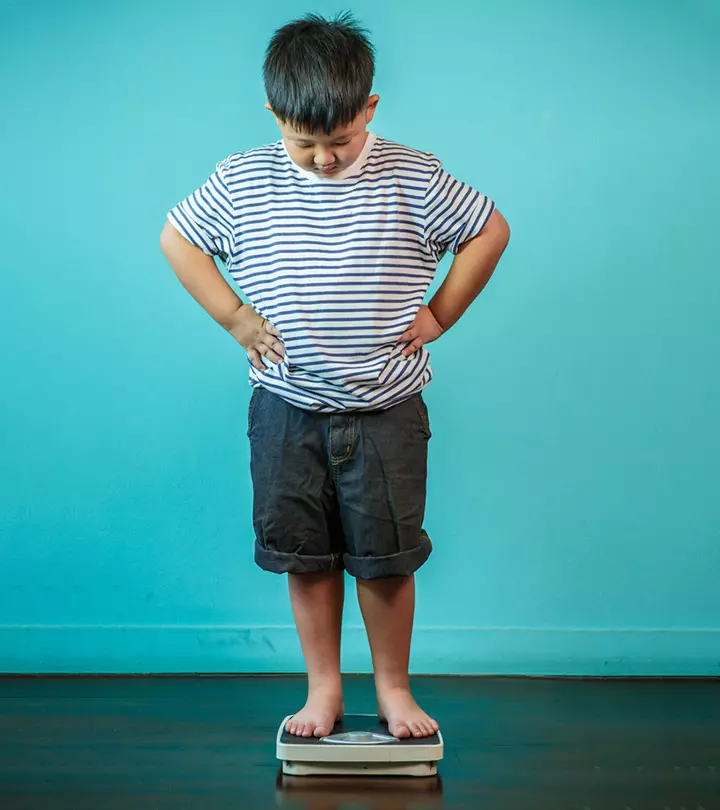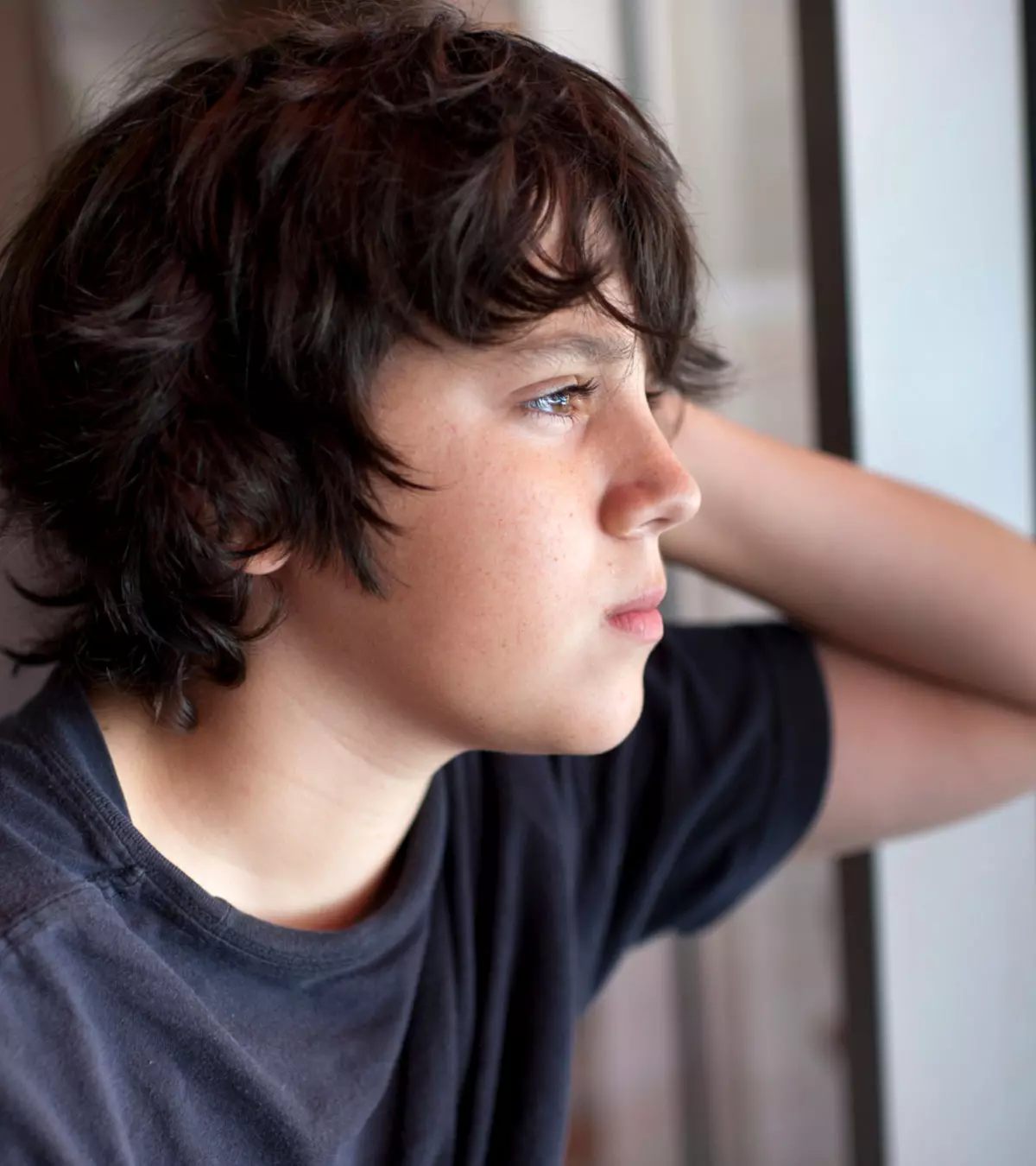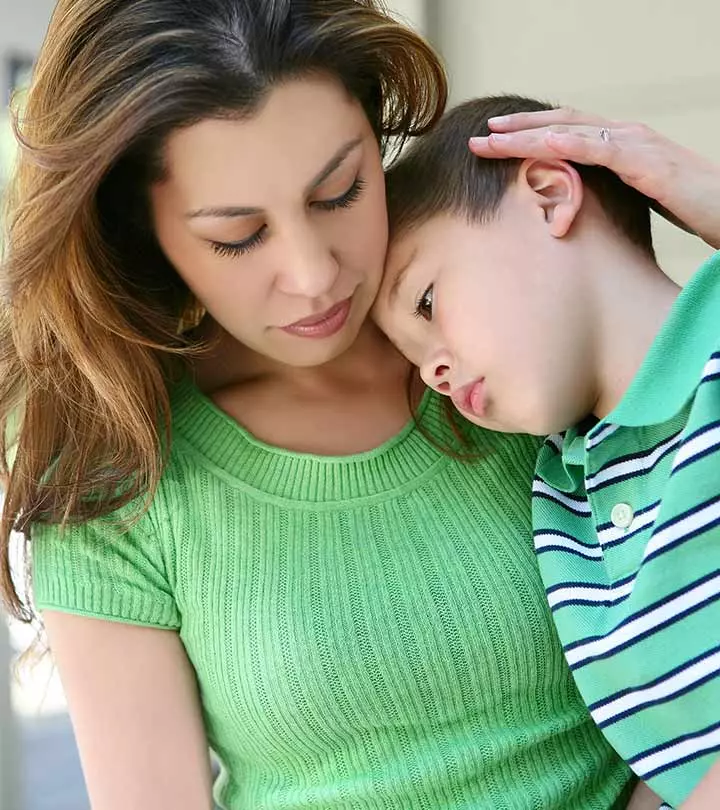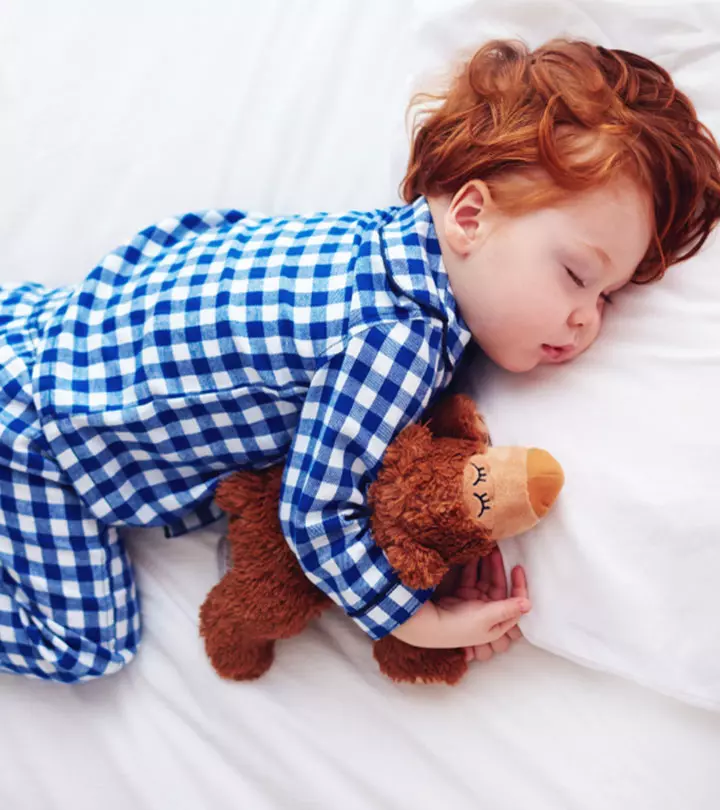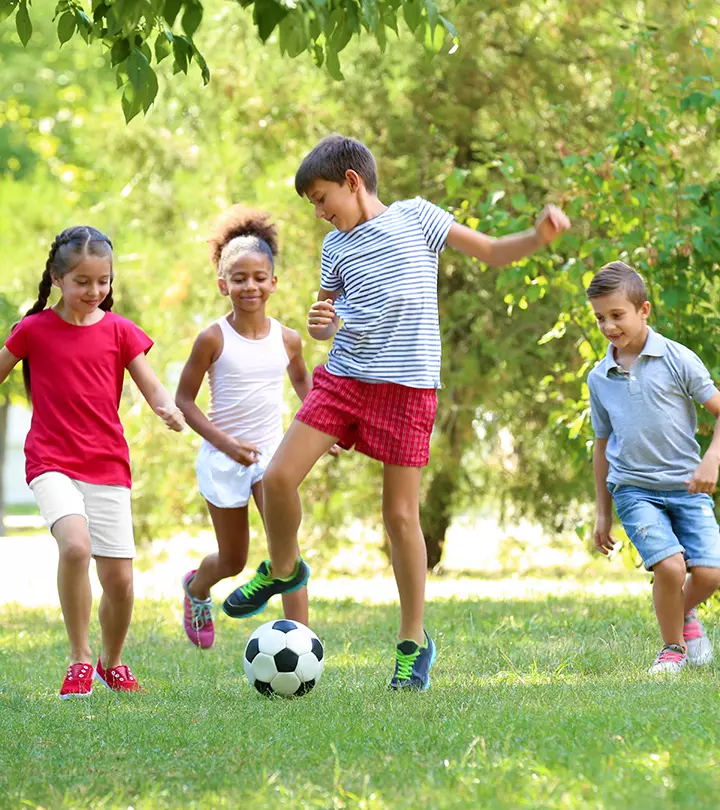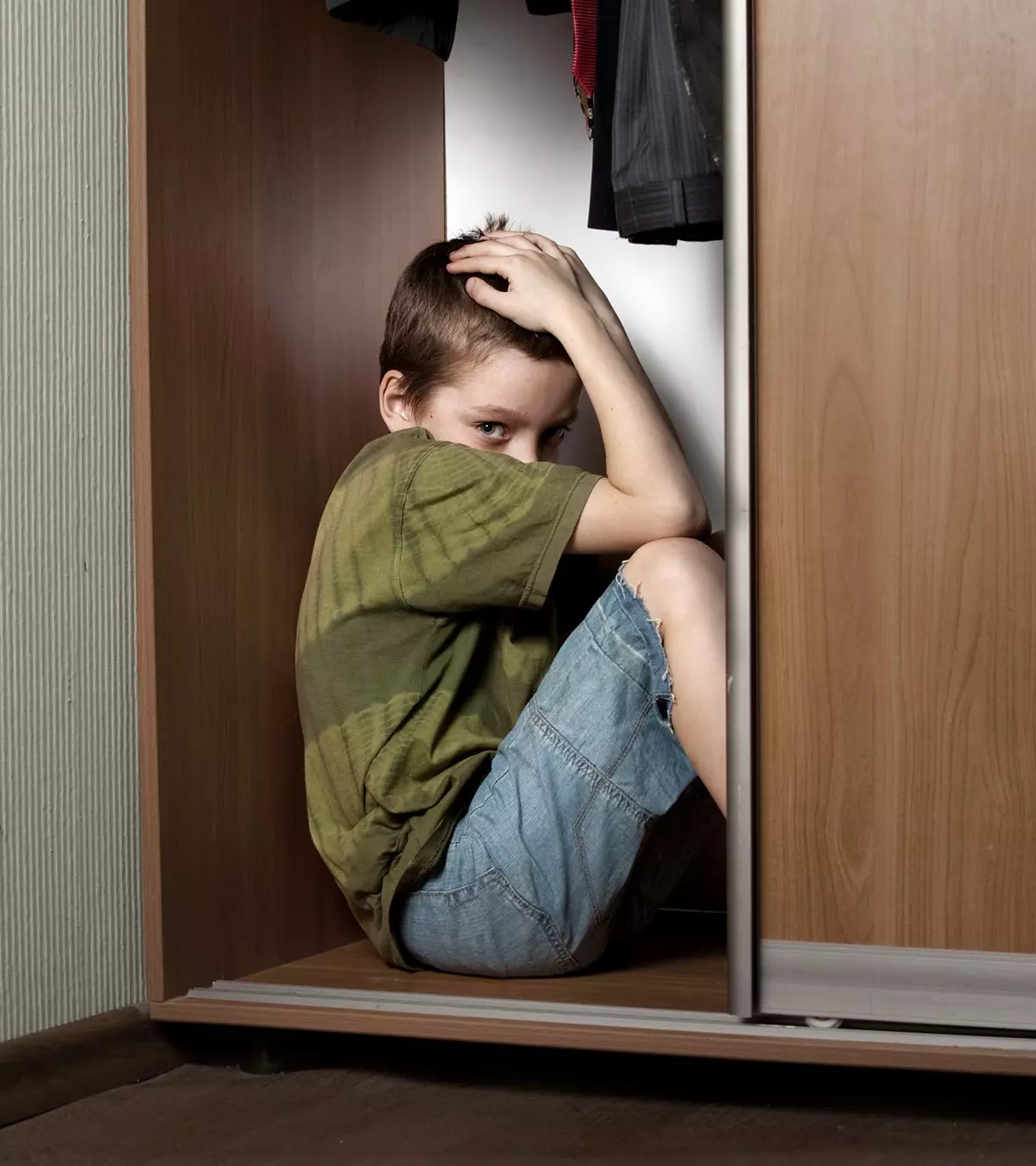
Image: ShutterStock
Adopted child syndrome (ACS) is a term coined by some experts to describe the psychological and emotional issues adopted children experience. If the condition is not addressed on time, it may lead to other disorders, such as developmental delays, drug abuse, or attachment issues.

Therefore, parents should watch the physical and behavioral signs that indicate an ACS and try to find out the cause behind it. Through the integration of love, support, and affection, adopted children may be able to overcome these emotions. It is important to note that the concept of adopted child syndrome is not universally accepted, and its clinical validity remains debated. Nonetheless, understanding its implications can help adoptive families navigate the emotional challenges associated with adoption.
Read on the post to understand more about ACS, its causes, symptoms, effects, things you can do to avoid the condition.
Key Pointers
- Adopted Child Syndrome refers to emotional and psychological difficulties experienced by some adopted children.
- Symptoms of this syndrome may include anxiety, depression, and a sense of rejection.
- Emotional reactions such as abandonment, secrecy, differences in ethnicity, genetic differences, and guilt are commonly observed in adopted children with this syndrome.
- Although most adopted children live normal lives, some may face developmental delays, attachment issues, substance abuse, and a higher risk of criminal behavior.
- Adopted child syndrome can be overcome through empathy, understanding, unconditional love, and the establishment of a sense of permanency.
What Is Adopted Child Syndrome?
Adopted child syndrome is usually used to describe a condition that is a result of various psychological and emotional hardships an adopted child undergoes. It is associated with characteristics such as attachment disorders and deviant behavior to the likes of lying, stealing, inability to accept authority, and violence.
Though ACS is not a formal diagnosis, there are research works that talk about its effects.
Social worker Jean Paton, who was herself an adoptee, was the first to study ACS in 1953.
However, the term was only officially coined by David Kirschner in 1978 in his paper Son of Sam.
Symptoms Of Adopted Child Syndrome

At times, children cannot be expressive enough to share their trauma with their foster parents thus it is important for the parents to look out for any behavioral issues.
According to a study, adopted children are more likely to contract mental health problems than other children (1).
Some of the common symptoms of adopted child syndrome are:
- Low self-esteem
- Depression
- Identity crisis
- Anxiety
- Feelings of grief and rejection
Some of the common comorbid disordersiMultiple physical or mental conditions occurring in the same person are:
- Oppositional defiant disorder (ODDiA disorder characterized by a child’s tendency to defy, disobey, or get angry/frustrated with adult behavior )
- Attention-deficit/hyperactivity disorder (ADHD)
- Conduct disorderiAn emotional and behavioral problem characterized by behavior patterns in which the affected person violates the rules repeatedly
- Major depressive disorderiA mental disorder that results in a person feeling low and losing interest in daily activities
- Separation anxiety disorderiA mental health problem in which the child is apprehensive about separation from or losing parents or caregivers
Another study has found that 14 to 15 out of 100 adoptees have the chances of having ODD or ADHDiA neurodevelopmental disorder affecting the child's ability to pay attention, control impulses, and manage energy levels . This is twice as much as the non-adoptees getting these conditions (1).
Causes Of Adopted Child Syndrome
Apple Inc’s founder the late Steve Jobs was an adopted child. Though highly successful in life, he has often referred to “unresolved pain” of rejection and abandonment due to adoption. Here is a deep insight into the various triggers that an adopted child with ACS is prone to.
Here is a deep insight into the various emotional reactions an adopted child with ACS are prone to
1. Abandonment and loss
Adopted children develop a feeling of being abandoned by their mother.
In the book Being adopted: The lifelong search for self, published in 1992, researchers David M Brodzinsky, Marshall D Schechter, and Robin Marantz Henig say that children, if adopted within six months of their birth, would grow similar to a natural child.
However, psychotherapist Nancy Verrier in her book The Primal Wound in 1993 says that a child develops a bond with its mother from the womb itself.
“Bonding doesn’t begin at birth but is a continuum of physiological, psychological, and spiritual events which begin in utero and continue throughout the postnatal bonding period.
“When this natural evolution is interrupted by a postnatal separation from the biological mother, the resultant experience of abandonment and loss is indelibly imprinted upon the unconscious minds of these children, causing that which I call the ‘primal wound’.”
 Did you know?
Did you know?The orphaned and abandoned children carry the trauma of separation from their biological parents. They may not remember the trauma but can feel it subconsciously. There could be an innate fear that their adopted family would leave them one day adding to their feeling of insecurity. Properly guided counseling or therapy may help in this case.
2. Secrecy of parents
The adopted family might not tell the adoptees the details about their natural parents. The very fact that they have been adopted could be hidden if the adoption took place early in a child’s life. However, once they come to know about it, the children might want to know more about their original family.
Sometimes, even the adoption agencies would not have details about the biological parents of adoptees, and this lack of information could make the person face many existential problems like feeling alienated, misunderstood and feeling like they don’t belong.
3. Differences in ethnicity

If the adopted family is from a different origin than the adoptee, the child could find it difficult to adjust. Their color, race, practices may all be different. For instance, if an American family adopts an Asian origin child, the cultural differences would be so profound that the adoptee may grow up with identity issues which are especially pertinent within the teenage phase when the identity is being formed. The differences in ethnicity could also cause the child to be exposed to differences in cultural beliefs and practices, resulting in adaptation challenges.
4. Genetic differences
As they grow up, the adopted children observe that their physical features, preferences, and intellectual abilities are different from those of the adopted family. This could cause alienation and lead to issues with adjustment as there is no one who resembles them physically or psychologically, exacerbating the symptoms of the syndrome.
5. A feeling of guilt
As the adoptee ages, they may feel guilty of not giving enough to their adopted family. They may be overburdened by a sense of gratitude. Added to this, their eagerness to know about their original family may make them think that they are doing injustice to the family that has adopted them. They may also feel guilty about not being able to fulfill the expectations of their adopted family due to the adaptational styles they learnt under the influence of their faulty role models from earlier in their biological or foster homes (9).
6. The burden of being the ‘chosen one’
The adoption agency and the people around might tell the adoptee that they are the ‘chosen one’ by the family, with an intention to make them forget about their past and merge into the new setup.
It could also make the adoptee come out of the feeling of being abandoned.
However, over compensating could make them feel that the family is being charitable by adopting them, thus developing negative thoughts.
7. Trauma from pre-adoptive conditions
Studies indicate that most adopted children tend to come from dysfunctional families. Witnessing domestic violence or parental conflicts, undergoing childhood abuse or neglect, loss of loved ones, and living with substance-dependent or mentally ill caregivers are a few pre-adoptive traumas that may give rise to behavioral and emotional problems in adopted children. Adopted children may not know how to let go of such immature or reflexive coping strategies they developed in response to their earlier helplessness, despite being removed from those challenging conditions (10).
8. Undiagnosed medical conditions
Adopted children tend to come from families that likely did not have the resources to raise healthy children. Socio-economically backward biological parents who may have lacked access to quality prenatal nutrition or medical care might have scavenged for food, lived in unsanitary conditions, and may have delivered without appropriate medical attention. These children could be malnourished and have undiagnosed developmental or neurological conditions such as trisomy 18 or 21, autism, cerebral palsy, or fetal alcohol syndrome. Some could also have cognitive impairment and birth defects such as impaired vision, hearing, or movement issues that make it difficult for them to adjust to the functional aspects of their new family and the society around them (11)(12).
Effects Of Adopted Child Syndrome
If adopted early in their life, children grow up similar to other kids. In the US, nearly 120,000 children are adopted every year. There are currently more than 2.6 million (2) adopted individuals in the country. Most of them lead a normal life without any psychological issues.
However, a few children might have to face the effects of ACS. Here are some of the effects of the syndrome.
1. Developmental delays
Adopted children could reach physical and emotional development milestones late. They may not be able to do things that kids of their age usually do, or they may think and behave younger than their age. Developmental delays could manifest in the form of:
- Eagerness to grab attention or rewards
- Inability to socialize
- Difficulty in learning motor skills
- Inability to communicate their needs
- Delay in emotional comprehension and maturity
- Poor self-control and impulse regulation (13)
2. Eating disorders
Their pre-adoption life makes children anxious eaters. They may have grown up under circumstances where there was a scarcity of food (3). This could lead to:
- An unhealthy relationship or obsession with certain types of food
- Overeating due to fear that they will not get the next meal
- Under-consumption due to problems in eating certain foods such as solids
- Hoarding of food
- Stealing food
3. Attachment issues and reactive attachment disorder
The neglect and negative environment early in their life could lead to attachment disorders like Disinhibited Social Engagement Disorder (DSED)iA disorder in which a child may be outgoing and friendly but finds it difficult to form deep or meaningful relationships or Reactive Attachment Disorder (RAD)iA disorder in which a child cannot connect with their parents or caregivers due to a past history of neglect or abuse . This could be the result of them being abandoned, uncared for, and unloved. This will make children withdraw from others, avoid eye contact, be uninterested in playing, and be indifferent to affection, among others (4). Such children may opt for an avoidant-dismissive attachment style due to the belief that they cannot rely on others (13).
4. Alcohol and drug abuse

As teenagers, adopted children could get drawn to alcohol and drug abuse, in the absence of proper care from their adoptive parents. If the biological parents have a history of substance use, and the environment in the adopted family is not cordial, the risk of adoptees getting addicted doubles.
Virginia Institute for Psychiatric and Behavioral Genetics director Kenneth Kendler says: “For an adoptee, having a biological parent with drug abuse who did not raise you doubles your risk for drug abuse.”
“But we also found an important role for environmental factors. If you have an adoptive sibling – with whom you have no genetic relationship – develop drug abuse that also doubles your risk for drug abuse. A bad environment can augment the effect of genetic risk for drug abuse.”
5. Inclination towards crime
Children do not become criminals by themselves. Be it adopted or biological, a child who undergoes abuse and ill-treatment, negligence, or even over-pampering might choose a path of violence and crime. As adopted children have high chances of growing up in an unsympathetic environment, they tend to show an inclination toward crime (5). The pressure to survive at any cost may also cause them to lack an understanding of right from wrong and good from bad, affecting their ability to express, feel, or understand guilt, remorse, pity, shame, compassion, or empathy.
6. Learning issues
Children who were abandoned at orphanages or foster homes quite early in life, or just before they joined school, may rarely receive a learning friendly environment. The low social funding for such facilities may not allow them to be able to provide the children with quality educational opportunities. Furthermore, adopted children may not receive age-appropriate education or school placement in cases where their exact date of birth is unknown. In some other cases with adequate opportunities, children themselves may not show a keen interest in schooling due to abuse or bullying issues, learning difficulties, medical limitations, physical disabilities, or other unexplained reasons (11).
How To Avoid Adopted Child Syndrome?
Adoption can make a huge difference to abandoned children who have experienced a tough life and rejection in their young lives. As foster parents, you have to put in extra effort to make the kids settle down in a new environment of care and love. Here is a guide to avoid ACS in the child (6) (14) (15):
1. PLACE attitude:

Attachment psychologist Dan Hughes has come up with the acronym PLACE, which stands for being playful, loving, accepting, curious, and empathic to your adopted kid.
Playful: Be playful with the child as this would help them realize their self-worth and relax. Fill in your free-time with some games or fun activities with the kid.
Playfulness also includes a simple ruffling of their hair, winking at them, cracking a joke, or smiling at them. This can reassure the child about your love.
Loving: You should be the first person to bring love into the relationship and your adopted child will eventually follow you. Understand that they are too young and frightened to adjust to the environment instantly.
Hold their hand, hug them, have a sweet talk, and show them that you care for them. Give them time to understand you and build faith in you. In the meantime, practice honesty and trustworthiness.
Accepting: Accept the child the way they are. That is the first step to mold them in the way you want.
Share your expectations gradually, after they settle down in your family.
Curious: When your child does something unacceptable, do not admonish them immediately. Instead, be curious to know why they did that. Let them know your curiosity by asking questions aloud. It will help them in understanding their mistake, and give them the confidence to talk to you about it.
Empathic: Empathize with your child. If they are finding it difficult to read or write, tell them that you understand their difficulty. Help them learn the lessons, instead of getting furious or disappointed with them. But empathy needs to be genuine and not flippant.
2. Permanency:
Your child may not like to leave you or may get cranky if you are away even for a short time, as they might be afraid of losing you.
It is for you to build that sense of permanency in them. Make them understand that you are with them permanently even if you are away for a few hours or days. These relate back to their attachment and abandonment issues.
To reassure them of permanency and value, talk to them about what they would like to do when they grow up and discuss how you would support them in their future endeavors. Making such long term plans may address their fear of abandonment and reassure them of your presence.
3. Constancy:
Constancy is related to permanency as it gives children stability and resilience. It makes them realize that your angry reaction to a particular incident is because of their misbehavior but not because you hate them. Consistency is key when dealing with a child.
- Develop constancy by being pleasant even while reprimanding them. They will understand that you are not happy with them.
- If they disappoint you, talk to them openly without hurting their feelings. Tell them what your expectation was and why it was not met.
- In case you feel a loss of control during conflicting situations, inform the child that you need time to think and ask for space. Reassure them that you will come back to them when calm and follow through with your promise.
4. Reduce stress and anxiety:
- Be calm and make yourself available to them to reduce their levels of anxiety, if any. Make things predictable for them so they know what to expect If they do something wrong, let them know the consequences immediately, without making them wait anxiously for the ‘punishment’.
- Avoid threatening them with abandonment as punishment or take away whatever they love to make them feel remorseful of bad behavior.
- Pick which battles you wish to fight with them, especially when they are emotional. Meet their self-righteous anger, attachment anxiety, and self-preservation tendencies with warmth, reassurance, honesty, safety, and compassion.
- Make yourself available for them whenever they need to feel a sense of security. Allow them a non judgemental and empathetic space to communicate their needs, thoughts, and feelings.
- Equip them with stress management coping styles such as humor, hobbies, deep breathing, meditation, exercising, journaling, and seeking help.
- Identify their stress areas and mitigate them.
Kate, a wife, and a blogger, discussed how positive reinforcements and love helped reduce the stress and anxiety of their adopted child when he was triggered by a comment they made. She writes, “Suddenly his (her child’s) whole facial expression changed, he quietly sat down, then put his little hands over his eyes and began rocking back and forth. Steve (her husband) and I immediately scooped him up in our arms and sat with him, holding him tightly, while whispering in his ear that we loved him over and over.
“Within seconds (though it felt like hours) his little body just relaxed. He took a big deep breath, and he sat nestled into my chest as I held his sweet body. Then he got up and began to play again with a big smile on his face. This whole experience broke our hearts and in fact, even writing about it now, brings tears to my eyes. This rocking back and forth is referred to as ‘orphanage syndrome.’ Many children in orphanages do this when they are hurt or afraid. Since they don’t have a mommy or daddy to comfort them, they have learned how to soothe themselves (i).”
5. Build self-esteem:

Self-esteem can be low in adopted children. Develop self-esteem by making them feel important.
- Appreciate their new milestones and applaud them for their achievements. Offer praises and small surprises as rewards for good behavior.
- Allow the child to make mistakes and respect their struggles by aiding them to push through it instead of rescuing them.
- Build them up, make them feel confident by allowing them to make choices and take responsibilities for their consequences, irrespective of whether it is positive or negative.
- Establish a routine and allow them to add their own needs to it, such as how long they would like their play time to be or which day they would like to have family movie nights.
- Encourage them to participate in the household by allowing them to help you out with chores, food preparations, and other errands.
- Allow them to make simple decisions like what they would like to wear or eat for dinner, how they would like to spend their weekends or family get-togethers, and where they would like to go for vacations.
6. Discipline positively:
- Avoid giving commands to the child, such as, “I want you to do this,” “You have to stop being like that,” and so on. Instead, give him choices of ‘this or that’ and let him choose. This works well for both your child and you.
- Replace punishments with logical consequences, so that he understands that doing ‘this’ will lead to ‘that’. For example, he will know that if he spills milk, he will end up cleaning it.
- Keep your bouts of anger short, for around 60 seconds, and have calmer conversations for a longer time.
- Maintain eye contact and remain composed while explaining and reinforcing boundaries that have been set for your common welfare
7. Encourage socializing but supervise:
Help your child to socialize with their classmates and neighbors. Take them to a park and let them play with other children. However, ensure that they are not being bullied by other children or vice versa. Explain to them the ways to be amicable yet assertive.
Frequently Asked Questions
1. Why do some parents hide the adoption truth from their children?
Some parents might want to keep the adoption as a secret to:
- Protect the child from the pain of separation.
- Wait until the kid is mature enough to understand the situation.
- The adoptive parents may fear that the children might leave them once they know about their biological parents.
- The biological parents did not want to reveal their identity.
However, the trend is changing as more parents are looking for an open adoption.
2. Are adopted children violent towards their parents?
A child can turn violent irrespective of the parents being adopted or biological. More than the type of parents (adopted or otherwise), it is the environment at home and the background of the parents that might have an influence on the behavior of the child.
3. How soon can an adopted child accept their new parents and family?
This differs with each family. It is the adopted parent’s responsibility to make the kids feel at home. Create a reassuring atmosphere for them to accept the changes in the shortest possible time.
4. How do I support a child with reactive attachment disorder (RAD)?
As the child with RAD is under stress, you need to take care not to show your frustration on them. Here are a few tips to parent a child with RAD:
- Do not lose your patience, no matter how annoying the situation could be.
- Create a fun environment at home, and develop a sense of humor in the child.
- Have realistic expectations from the child, and celebrate their successes.
- Stay positive even if the child ignores your overtures. Keep trying and they would recognize your efforts.
- Seek help from your family and friends.
5. What resources are available for adoptive parents?
Adoptive parents can access various resources to prepare for this journey, such as local support groups, online forums, and adoption-focused books. These provide valuable insights, shared experiences, and strategies for addressing adoption-related challenges. Additionally, professionals specializing in adoption—such as counselors, social workers, or adoption agencies—can offer personalized guidance tailored to your family’s needs, ensuring a smoother transition and stronger relationships. These resources collectively create a supportive network to navigate the joys and challenges of adoption effectively.
6. Are adoptees narcissists?
A small study has found that adoptees are not likely to become narcissistic children (7). However, extensive research is required.
7. Should you tell a child they are adopted?
Yes, you should tell your child if they are adopted when they are young. So avoid risking the chance of them finding out from someone else (8).
Adopted child syndrome (ACS) is a psychological condition that some adopted children face. It may be difficult for parents to identify ACS symptoms as their reclusive behavior, and misdemeanor may be easily misinterpreted as displeasure. Be alert to identify the symptoms and seek medical care if you suspect ACS. Timely intervention by mental health professionals plays a vital role in improving the child’s mental health and family dynamics. Also, seek resources and connect with support groups that specialize in adoption-related issues to receive consistent support and strategies for navigating the complexities of adoption and its impact on mental health.
Infographic: Signs Of Adopted Child Syndrome And How To Avoid It
You may think your child is free from sadness now that they have a caring family, but adopted child syndrome is real. Their past trauma and the overwhelming change can cause them to experience certain symptoms highlighted in this infographic. So give it a read and learn how to help them avoid ACS.
Some thing wrong with infographic shortcode. please verify shortcode syntax
Illustration: Adopted Child Syndrome - Causes Effects And Ways To Prevent It
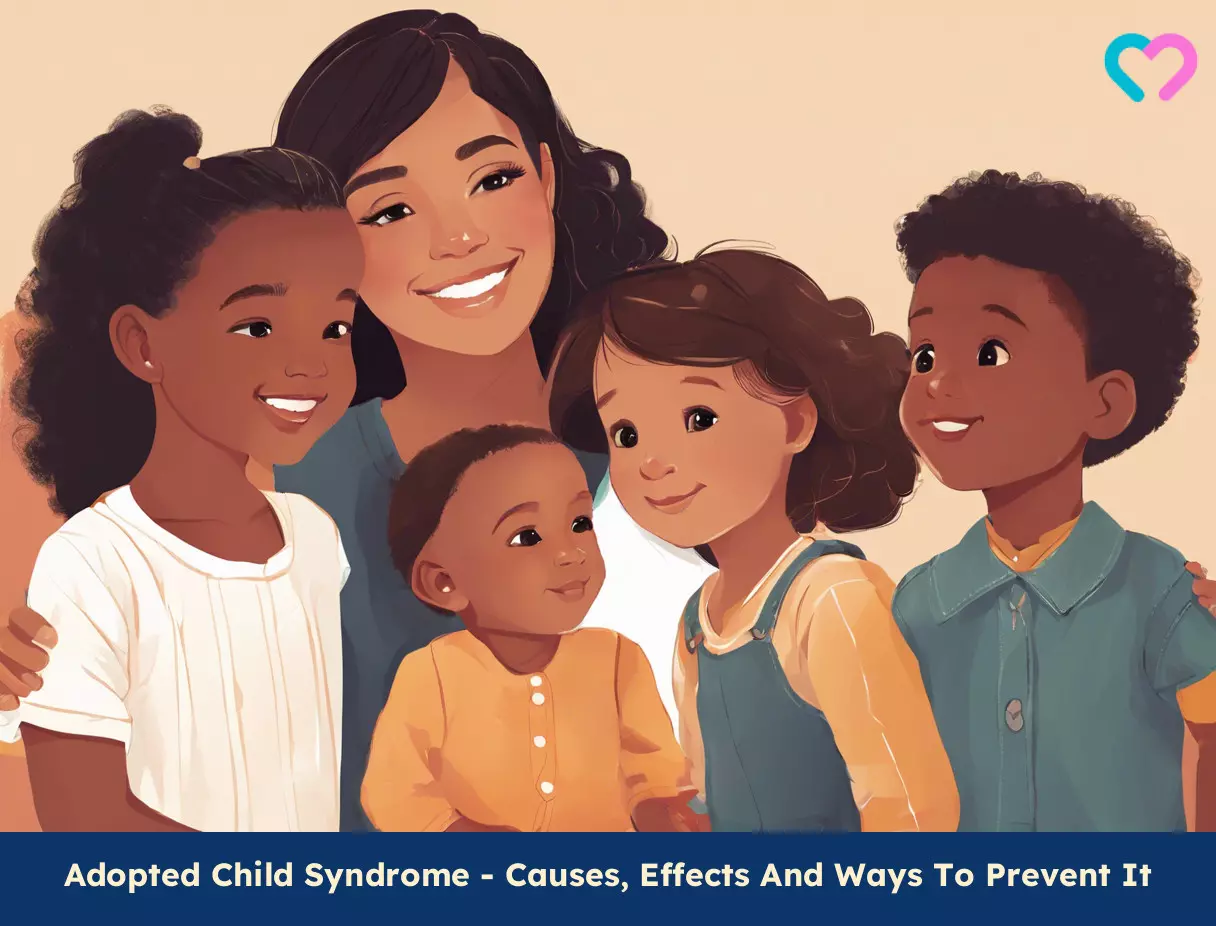
Image: Stable Diffusion/MomJunction Design Team
Adopted children can suffer from various emotional and behavioral disorders. This video explains the difficulties they face at school and with family.
Personal Experience: Source
MomJunction articles include first-hand experiences to provide you with better insights through real-life narratives. Here are the sources of personal accounts referenced in this article.
i. Orphanage syndrome;https://steveandkate.wordpress.com/2009/11/17/orphanage-syndrome/
References
- Margaret A. Keyes et al. (2015); The Mental Health of U.S. Adolescents Adopted in Infancy
https://www.ncbi.nlm.nih.gov/pmc/articles/PMC4475346/ - Adoption Statistics.
https://travel.state.gov/content/travel/en/Intercountry-Adoption/adopt_ref/adoption-statistics-esri.html?wcmmode=disabled - Overview – Eating disorders.
https://www.nhs.uk/mental-health/feelings-symptoms-behaviours/behaviours/eating-disorders/overview/ - Attachment Disorders in Children: Causes Symptoms and Treatment.
https://www.helpguide.org/family/parenting/attachment-issues-in-children - P D Jaffe; (1997); Adoption and Murder.
https://www.ojp.gov/ncjrs/virtual-library/abstracts/adoption-and-murder-advances-psychology-and-law-p-274-280-1997 - Parenting Your Adopted Teenager.
https://cwig-prod-prod-drupal-s3fs-us-east-1.s3.amazonaws.com/public/documents/parent_teenager.pdf - childhood experiences.
https://www.sciencedirect.com/science/article/abs/pii/S0145213420303112 - Telling your child they’re adopted.
https://www.familylives.org.uk/advice/your-family/fostering-adoption-kinshipcare/how-to-tell-your-child-they-are-adopted - Amy L Paine et al.; (2025); Charting the trajectories of adopted children’s emotional and behavioral problems: The impact of early adversity and postadoptive parental warmth.
https://pmc.ncbi.nlm.nih.gov/articles/PMC8374623/ - Educational Issues in Adopted Children.
https://www.chop.edu/conditions-diseases/educational-issues-adopted-and-foster-children - Do Adopted Kids Have More Problems?
https://parentingtodaysteens.org/articles/adopted-kids-problems-2/ - Behavioral and Emotional Issues in Adopted Children.
https://www.chop.edu/conditions-diseases/behavioral-and-emotional-issues-adopted-and-foster-children - Parenting Your Adopted School-Age Child.
https://www.adoptionassociationks.org/uploads/5/4/1/7/54171879/parent-school-age.pdf - The Joys and Challenges of Parenting Older Adopted Children.
https://adoptioncouncil.org/publications/adoption-advocate-no-77/
Community Experiences
Join the conversation and become a part of our nurturing community! Share your stories, experiences, and insights to connect with fellow parents.
Read full bio of Dr. Holly Schiff
Read full bio of Bhavana Navuluri
Read full bio of Rebecca Malachi
Read full bio of Apoorva K





